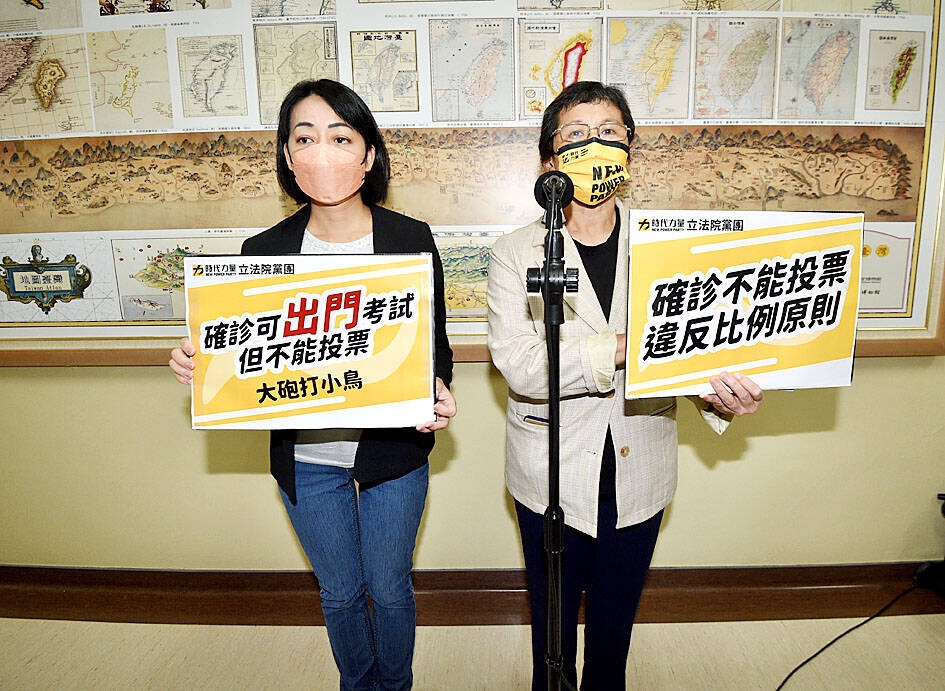New Power Party (NPP) lawmakers yesterday called on the Central Election Commission to enable voting by people with COVID-19 in the Nov. 26 local elections, saying that pandemic restrictions could jeopardize a referendum on lowering the voting age to 18.
The commission’s refusal to provide people with COVID-19 with an alternative voting method undermines civil rights and could be unconstitutional, NPP Legislator Claire Wang (王婉諭) said.
With the nation still reporting about 30,000 COVID-19 cases per day, about that number of people would not be able to cast their vote if the commission does not take action, she said.

Photo: Lo Pei-te, Taipei Times
Premier Su Tseng-chang (蘇貞昌) on Oct. 7 said in a question-and-answer session in the legislature that people with COVID-19 cannot vote because they cannot leave their residence, which is in accordance with Article 23 of the Constitution and the Communicable Disease Control Act (傳染病防治法), Wang said.
However, four days later, the College Entrance Examination Center (CEEC) allowed positive cases to take part in school exams, she said.
As people with COVID-19 were able to safely participate in the examinations by having family drive them or hiring a disease prevention taxi to take them to test sites, there is no reason that confirmed COVID-19 cases cannot go to out to vote if public health precautions are taken, she said.
The commission two years ago said that officials would ensure that people with COVID-19 can vote by giving them a special time to cast their ballots, she said.
“Is it too much to ask the CEC to do what the election commission has already done?” she asked.
The government has been relaxing pandemic restrictions to boost the economy, but continues to adopt double standards when it comes to voting, she said.
Sacrificing people’s right to vote “in the name of public interest” is not reasonable and does not conform to the principle of proportionality, she said, adding that it likely contravenes Article 23 of the Constitution on protecting people’s rights and freedoms.
The commission should devise ways to allow people with COVID-19 to leave home to cast their ballots, she said, calling on all political parties to support the right to vote.
The election in part is to decide major issues, including a proposed amendment to the Constitution to lower the voting age, which the party supports, NPP Chairwoman Chen Jiau-hua (陳椒華) said.
“As the pandemic plateaus, we ask that the CEC reconsider its position on this matter and explain its reasons to the general public, “ she said. “The government should do more to protect the voting rights of people with COVID-19.”

Taiwanese can file complaints with the Tourism Administration to report travel agencies if their activities caused termination of a person’s citizenship, Mainland Affairs Council Minister Chiu Chui-cheng (邱垂正) said yesterday, after a podcaster highlighted a case in which a person’s citizenship was canceled for receiving a single-use Chinese passport to enter Russia. The council is aware of incidents in which people who signed up through Chinese travel agencies for tours of Russia were told they could obtain Russian visas and fast-track border clearance, Chiu told reporters on the sidelines of an event in Taipei. However, the travel agencies actually applied

Japanese footwear brand Onitsuka Tiger today issued a public apology and said it has suspended an employee amid allegations that the staff member discriminated against a Vietnamese customer at its Taipei 101 store. Posting on the social media platform Threads yesterday, a user said that an employee at the store said that “those shoes are very expensive” when her friend, who is a migrant worker from Vietnam, asked for assistance. The employee then ignored her until she asked again, to which she replied: "We don't have a size 37." The post had amassed nearly 26,000 likes and 916 comments as of this

New measures aimed at making Taiwan more attractive to foreign professionals came into effect this month, the National Development Council said yesterday. Among the changes, international students at Taiwanese universities would be able to work in Taiwan without a work permit in the two years after they graduate, explainer materials provided by the council said. In addition, foreign nationals who graduated from one of the world’s top 200 universities within the past five years can also apply for a two-year open work permit. Previously, those graduates would have needed to apply for a work permit using point-based criteria or have a Taiwanese company

The Shilin District Prosecutors’ Office yesterday indicted two Taiwanese and issued a wanted notice for Pete Liu (劉作虎), founder of Shenzhen-based smartphone manufacturer OnePlus Technology Co (萬普拉斯科技), for allegedly contravening the Act Governing Relations Between the People of the Taiwan Area and the Mainland Area (臺灣地區與大陸地區人民關係條例) by poaching 70 engineers in Taiwan. Liu allegedly traveled to Taiwan at the end of 2014 and met with a Taiwanese man surnamed Lin (林) to discuss establishing a mobile software research and development (R&D) team in Taiwan, prosecutors said. Without approval from the government, Lin, following Liu’s instructions, recruited more than 70 software